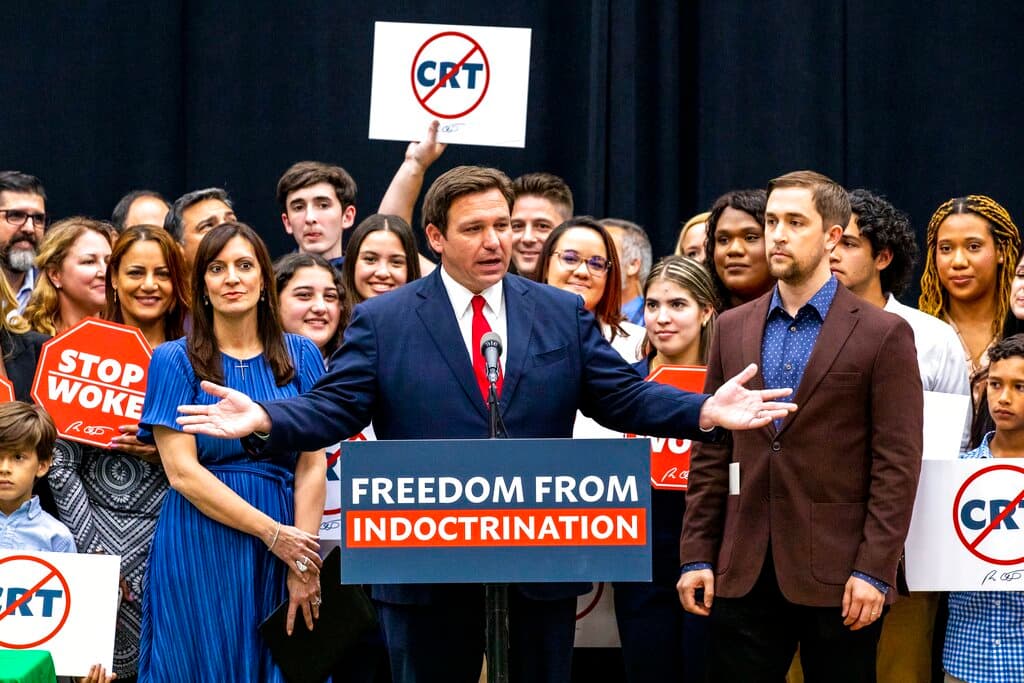DeSantis Balks at Florida House’s Plan to Expand School Choice Program
Mr. DeSantis has had little to say about the proposal despite his close collaboration with the state legislature on several education-related issues.

Florida’s state house wants all Floridians to be able to pursue the educational program of their choice, but Governor DeSantis might not be on board with the ambitious new program.
Florida’s House Bill 1, which has passed the state house and will likely see a senate vote this week, removes an eligibility requirement from a pre-existing program for low-income students, the Family Empowerment Scholarship Program.
Mr. DeSantis, however, has had little to say about Friday’s vote despite his close collaboration with the state legislature on several education-related issues last session.
If the senate votes yes, could Mr. DeSantis, who publicly criticized the legislation earlier this month, veto the bill? Or might he pressure the state senate to amend the bill in advance of a vote?
“If you have a family that’s very high income, they already have school choice,” Mr. DeSantis was quoted as saying. “They don’t necessarily need to be eligible for the program.”
The so-called “education governor” suggested adding an upper limit for income eligibility to the expanded program, which is expected to cost about $200 million, according to state auditors.
If the legislation gets signed into law, families who opt-out of public schooling will see state funds follow their children into alternative programs such as parochial schools or home-schooling options — instead of remaining in the public school system.
The state disburses funds — around $7,5000, roughly equivalent to the per-pupil spending at a public school — through an education savings account that students’ families can use for educational expenses of their choice.
School choice proponents have praised these savings accounts, better known as ESAs, for their flexibility over vouchers. Families can spend their dollars on any number of approved items, including tutoring, tuition, and textbooks.
Florida’s possible expansion to a universal ESA regime would mirror that of Arizona’s — which just last year became the first state to enact a universal school choice policy by stripping eligibility requirements for a similar program in that state.
Since Arizona’s debut of universal school choice, three states — Iowa, Utah, and Arkansas — have followed suit during legislative sessions this year. Additional bills proposing similar measures sit in at least a dozen state houses across the country.
Democrats have come out strongly against universal school choice proposals, suggesting they could “bankrupt” public schools, by allowing families, not just schools, to access taxpayer dollars earmarked for education.
“All of Florida’s children should be able to get the education they deserve and need at fully funded and staffed public schools,” the president of Florida’s biggest teachers’ union, Andrew Spar, said in a statement. “This bill is going to make life tougher for a lot of kids.”
“It will mean fewer resources in their schools, and fewer teachers and staff to meet their day-to-day needs,” Mr. Spar added.
The Sunshine State’s educational policy has been at the forefront of the national conversation for years. A previous Republican governor, John Ellis “Jeb” Bush, was an early supporter of school choice policies.
Prior to becoming governor, Mr. Bush co-piloted the state’s first charter school and increased their growth throughout his tenure. Today, there are more than 700 charter schools in the Sunshine State. While governor, Mr. Bush also created two voucher programs and a corporate tax credit scholarship program — none of which was universal.
The state’s current governor, Mr. DeSantis, has made a name for himself on education issues. He has tackled what he sees as educators and institutions gone rogue on cultural issues — promising to “Stop WOKE” and restore “Parental Rights in Education.”
In the previous legislative session, Mr. DeSantis and his allies in the state legislature cracked down on left-leaning pedagogical practices. Florida’s parental rights law, which has drawn criticism from Democrats across the country, prohibits instruction on gender identity and sexual orientation in kindergarten through second grade.
Another law, which is now partially enjoined by a federal court, bans critical race theory and “hostile” diversity, equity, and inclusion training in the state’s universities. Mr. DeSantis has not been afraid to put the power of veto to use, even with a strong Republican legislature.
If he sends this bill back to the legislature, he would be the first Republican governor in the country to reject a universal school choice measure.

